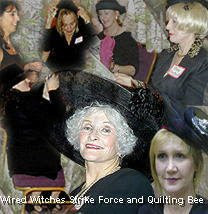Read the accounts of any School Board meeting and compare it with what you saw in person or on Ch 18. You scratch your head wondering how they edit what happens. It's a shallow pool in the editing room.
Ms. Brown and Ms. Stein:
I copied the above excerpt from The Wall, Suzy Creamcheese’s blog that the teachers flock to in order to express their unexpurgated opinions.
This teacher whom I quote above is right about the tepid and oblique comments of the press about school board meetings and ROSSAC vile conduct. I don’t know why you both don’t report things as they are when reviewing school-board meetings or reviewing administrative and board conduct off the dais. The answer is probably pressure from above.
Objectivity is an epistemological impossibility. Reports sift through individual consciousness and individual prejudice. In case of newspaper reporters, it coincides slavishly with the political courage or lack of it of the brass of the newspapers they work for. The level of courage displayed by a newspaper comes from the guts or lack of it of the paper’s top people, the ones who have insinuated their way up the journalistic administrative level by means of sycophancy and timidity.
Local papers have long colluded with the skullduggery that those who run the county schools engage in. It is a brand of journalistic cowardice that does no good for our students. The national election has constantly invoked the importance of education in our country. But how we will get good education without cleaning out the Augean stables of school boards and administration lairs is beyond me.
Administration in Hillsborough County comprises the academic dummies. They have degrees in marginal subjects with Styrofoam intellectual content. When they get out of some usually 3rd-rate college with an academic-lite degree, they head for administration because that’s where the money is. Smart college graduates go into teaching to be lorded over by the C and D students that clog administration.
The board is not interested in improving schools but in colluding with the administration to continue board members' sitting on the dais and implying to the community that they are sponsors of education. What hog wash. That stance gets refutation with board members' going along with anything the superintendent puts before them for their automatic approval.
The superintendent hires under-qualified people for administration slots whose chief credential is loyalty to the superintendent. These toadies garner up to $150,000 in yearly salaries. Compare that to teacher salaries. What does the discrepency say about shool-board aims? It says they don't give a damn as long as they sit in their ceremonial chairs on the dais.
The superintendent created two boutique jobs for superintendent administrative buddy Hamilton; these passed on the consent-agenda conveyer belt with not a murmur from the board--and not any comment in the newspapers, which act as stenographers for the board, not as astute observers or, God forbid, intelligent analysts.
Yet the board has the nerve to stamp “equal-opportunity employer” on every available surface. That claim is an abuse of the English language and a violation of the Federal equal-opportunity laws.
The proliferation of the blogs from the inside, non-administrative school people decry this situation encourages me. They do what the press is too complacent or too cowardly to do: tell what it’s like on the inside and tell how the administration with board complicity tolerates the retaliation by Elia and her goons inflict on any school employee with the courage to speak out openly. This retaliation is in charge of Linda Kipley, head of Professional Standards and the holder of a home-ec degree.
Gradually these inside critics will go public as their levels of indignation and courage rise. When enough do, the voters will smarten up as a result and wade into the school board and administration rackets to defeat complict school-board members, all of whom qualify for this colluder title now. That’s when the schools will improve and educate the students to a higher level of achievement.
Lee Drury De Cesare
C: All school board members
Administration members
Paul Tash
Rosemary Goudreau
Patrick Manteiga
Letitia Stein
Marilyn Brown
 This is on the island of Capri, which I loved. I would like to live there. But it is very pricey: only the super-rich can afford a place there. So I have to be content with Madeira Beach.
This is on the island of Capri, which I loved. I would like to live there. But it is very pricey: only the super-rich can afford a place there. So I have to be content with Madeira Beach.


